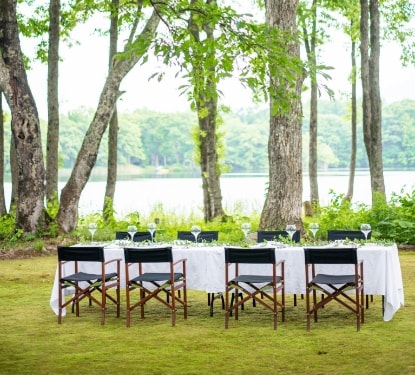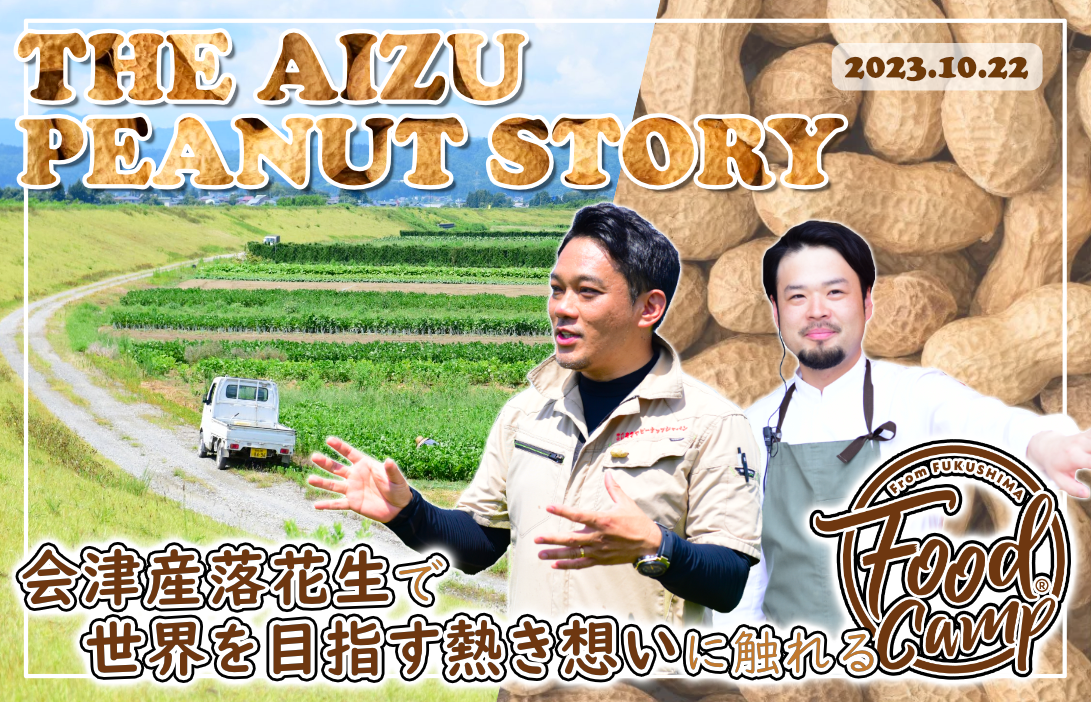
Aizu Peanuts Japan (APJ) has a vision: working with more than 70 peanut farmers in the Aizu and Kitakata area to make Aizu-produce peanuts something to be proud of. Working together with around 15 centers for people with disabilities as a cooperation between agriculture and welfare, APJ organizes the entire production chain, from planting and harvest, to cleaning, selecting, drying and roasting. The meal will be provided by Chef Inoue from Hashiyada Shoten, who specializes in French cuisine and considers it his life work to discover all of Aizu’s seasonal products. Come witness the debut of two new FoodCamp stars!
APJ (Aizu Peanuts Japan) Co., Ltd.
https://okuya-pj.co.jp/
Hayashiyada Shoten
https://hashiyada-shoten.jp/
Report
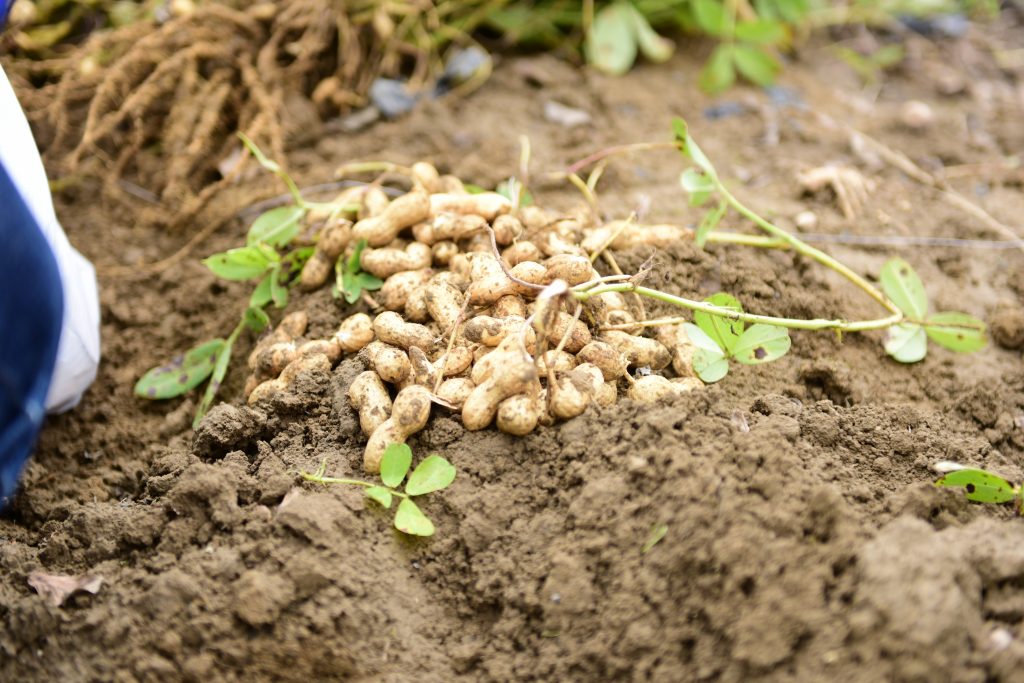
The October edition of FoodCamp was set in the city of Kitakata. Thanks to an incoming cold front, with 12 to 14 ℃ it was unseasonably cold. When the FoodCamp team took off for Kitakata – packed with all the equipment we needed to keep our guests warm – it was a cold, cloudy morning. But by the team the bus with the guests arrived at the peanut farm, many of the clouds had given way to a bright, blue sky. Recently, we have seen the FoodCamp guests work their magic several times, driving off the clouds by the time of their arrival.
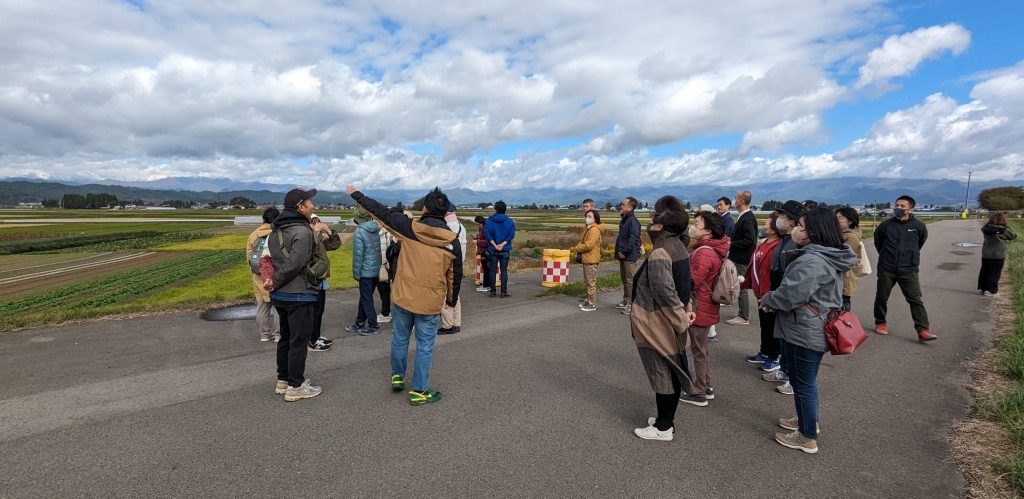
Owner of Aizu Peanuts Japan, Kentaro Matsuzaki, took us to a special place before setting foot on the peanut farm in the part of Kitakata called Shiokawa. The farm is located along the Aga River, and when you climb up the embankment, you get an amazing wide-open view of the farmland and wider Kitakata Area. We even got a wonderful glimpse of snow on the Iide Mountain Range; a rare sight at this time of year.
Discovering what makes peanuts so delicious this time of year
Not only were we blessed with the presence of Kentaro Matsuzaki, but also Shuhei Hashiyada, owner of Hashiyada Shoten. The two make a great duo, with a very infectious energy. Not only their humor but also the love they harbor for their hometown came across to the guests. With the ice broken despite the cold, it was time to start the harvesting experience. Not just for the guests, but for the FoodCamp team as well, the sight of fresh peanuts pullet out from the soil was a real first. When the leaves of the peanut plants start to dry up, is the right time to start harvesting, similar to potatoes.
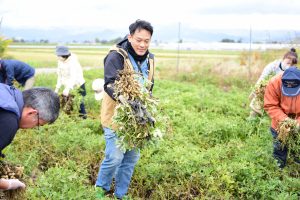
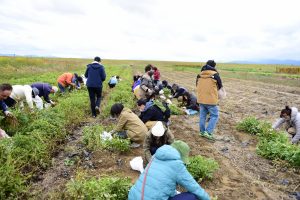
When harvesting peanuts, you grab a whole bundle by the root, put your body into it, and pull it out in one strong swoop.
When you do it right, you’re greeted by a big bundle of peanuts. The amount of peanuts per bundle was a surprise, even to us, leading to several of the guests to let out shrieks of joy. After removing the peanuts from the plants, the guests got to put them into a bag to take home, to their great delight.
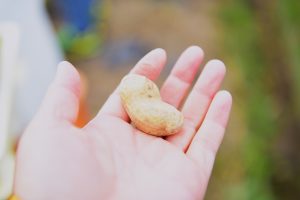
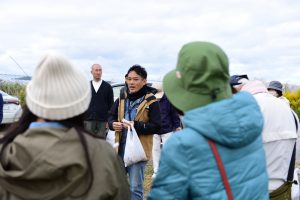
There was even time for a taste of freshly-boiled peanuts, harvested just that morning. Fresh peanuts boiled in salted water are soft and incredibly juicy. It takes about 40 minutes to boil them to perfection. This time of year, when the peanuts are freshly harvested, they reach peak deliciousness.
The Aizu Peanut Factory: Matsuzaki’s Idea Factory
While the peanuts on-site were delicous, it was of course important to save some room for the lunch that was to come at the next stop: the peanut factory in the Atsushio-district of Kitakata. This factory with its high ceiling used to be a sake brewery. You can still see some of the pipes that were used to transport sake rice to the former fermentation facility right next door.
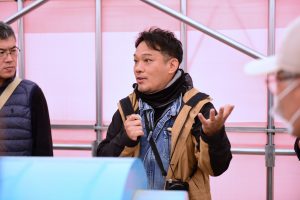
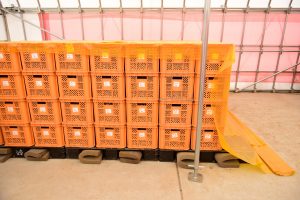
Next to the large factory, there is a greenhouse used to dry the freshly harvested peanuts. The device used to blow air onto the peanuts to dry them was originally used to dry potatoes but works equally well with peanuts. Matsuzaki: “When I first told the maker of the drying equipment that it was suitable for peanuts as well, he asked me right away if he could use that as an extra selling-point!” Matsuzaki implemented several original innovations, making the facility his very own idea-factory.
What’s behind the shutters?
After a tour of the greenhouse, it was time for the big reveal: the interior of the factory building. The shutters on both sides were closed, leaving the interior a mystery. With a knock on the door, the shutter was slowly drawn up, revealing the sight of a long row of dining tables, accompanied by cries of joy from the guests, as well as a big smile on Matsuzaki’s face. The decision to set up the dining area inside the factory was only made that very morning, after the realization that it would be too cold to have lunch outside like your usual FoodCamp. Matsuzaki hadn’t seen the transformation of the factory, as he had been with the guests at the farm while the FoodCamp staff was working their magic.
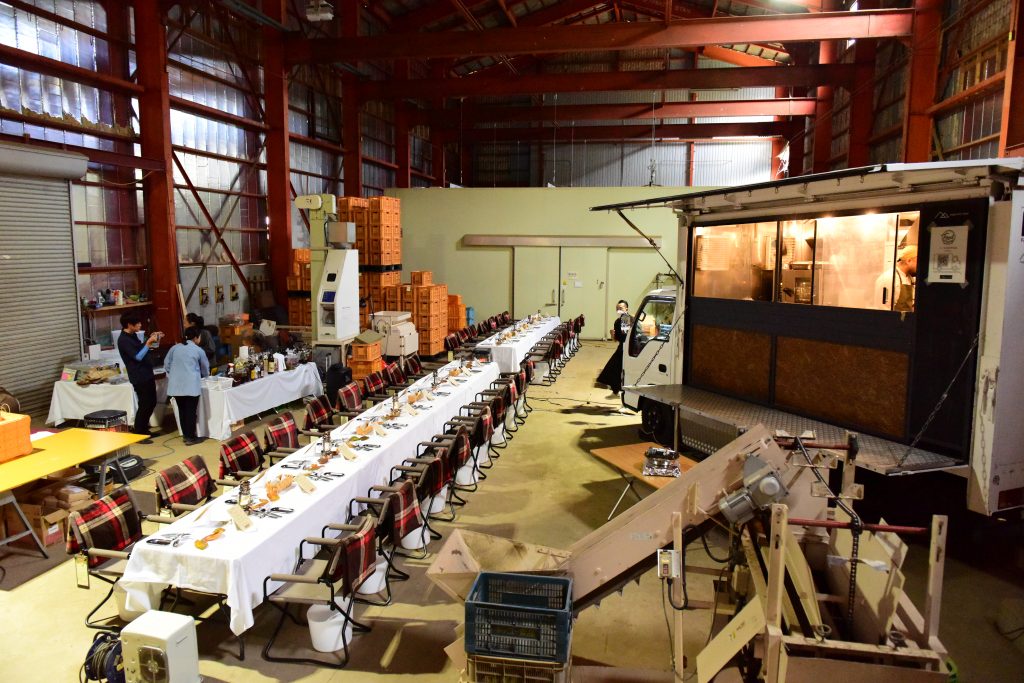 Surrounding the tables were the devices and equipment used for processing peanuts, left in place intentionally to maintain the factory’s atmosphere. And last but not least, the must-have for FoodCamp: our food truck! Thanks to the factory’s high ceiling, it was easy enough to set up the food truck indoors. Inside the truck, Chef Inoue from Hashiyada Shoten was hard at work preparing the day’s lunch.
Surrounding the tables were the devices and equipment used for processing peanuts, left in place intentionally to maintain the factory’s atmosphere. And last but not least, the must-have for FoodCamp: our food truck! Thanks to the factory’s high ceiling, it was easy enough to set up the food truck indoors. Inside the truck, Chef Inoue from Hashiyada Shoten was hard at work preparing the day’s lunch.
After an explanation by Matsuzaki of all the equipment used for selecting, cleaning and roasting peanuts, the guests all found their seat, awaiting a peanut-lunch in a truly extraordinary location.
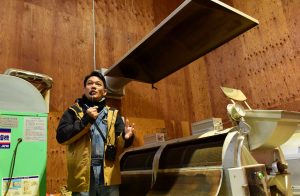
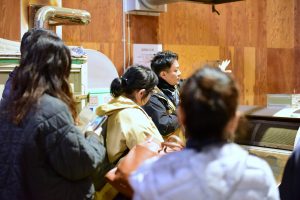
To keep a bit of the outdoor-feeling, the tables were decorated with persimmon leaves from the factory’s premises. That, combined with the soft lighting of the tabletop lanterns created a beautiful, warm atmosphere.
A surprise- and peanut-packed lunch
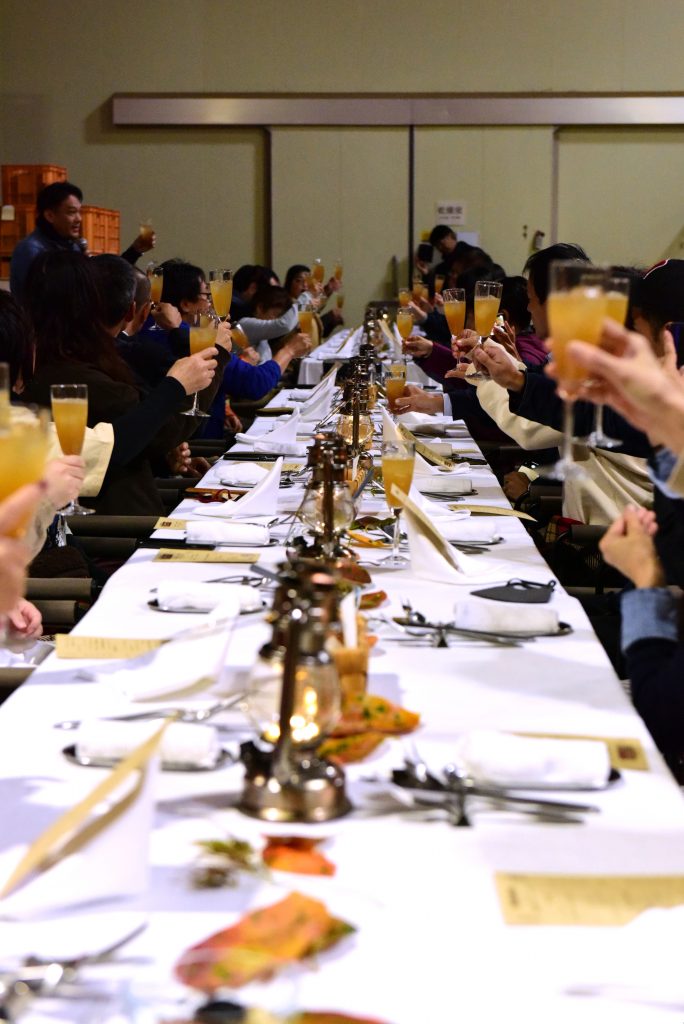
Time for a toast! Today’s first drink was a ginger ale, prepared with ‘Tsuru Ginger’ syrup developed by Hashiyada Shoten, using Japanese pepper from Kitakata. The spiciness of the pepper made for a very interesting, refreshing and delicious taste, and the blend of spices was a perfect warm-up for the guests, after the chilly harvesting experience.
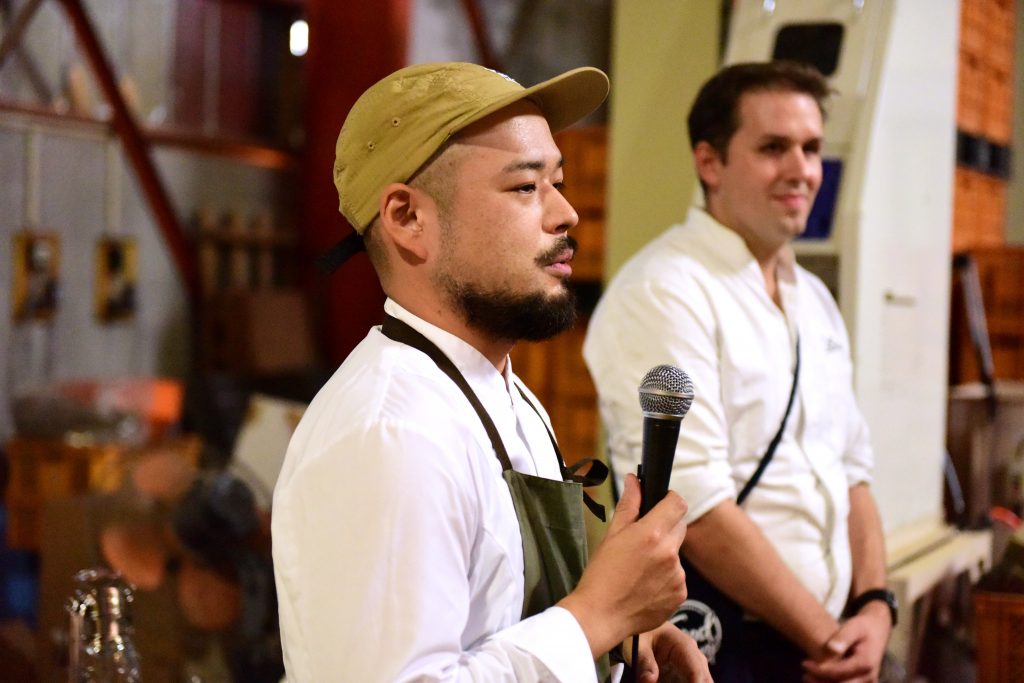
Kitakata offers an abundance of high-quality produce. For Chef Inoue, who has turned finding new local ingredients into a passion project, it was the perfect way to show off everything Kitakata has to offer. Of course, he managed to include peanuts in many ways.
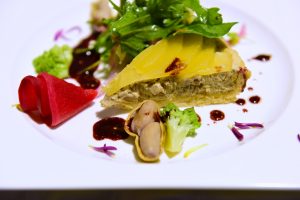
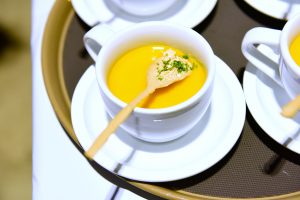
For example, the soup came with Chef Inoue’s personal invention: an edible spoon made from peanut paste! The main dish, a roast of Aizu beef, was served after a performance by the chef, during which he roasted the beef on top of peanut shells instead of the usual charcoal. Also, at the request of a Dutch staff member, he served sate (chicken skewers) with peanut sauce; an originally South East Asian dish that’s been a long-time favorite in the Netherlands.
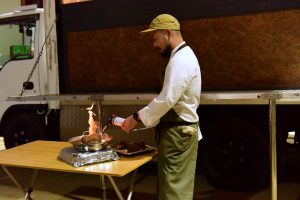
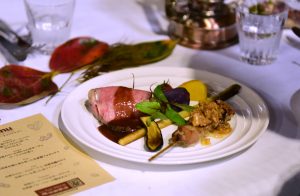
After a fulfilling lunch, of course, there was some time for shopping. Hashiyada Shoten had set up shop in a corner of the factory, selling their various original products.
Besides the products developed by Hashiyada Shoten, they also sold vegetables and rice from Mabune Farms in Aizu-Misato Town, and even products like as beds for growing mushrooms which proved especially popular. This type of very niche purchase is typical of the out-of-the-ordinary interests of FoodCamp guests!
Finally, there was time to make a brief stop at the Kitakata ‘Kita-no-Sato’ roadside station, where Aizu Peanuts Japan recently opened up shop. For those with some room left for an extra dessert, there was delicious peanut-flavor soft serve ice cream, as well as sets of various peanut-products available for purchase.
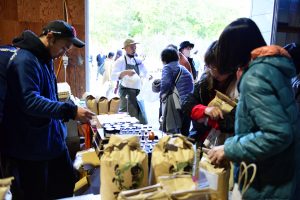
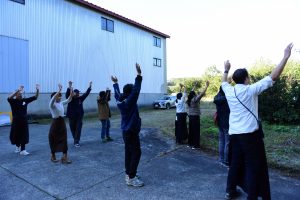
Thanks to all guests who attended this very special, peanut-packed edition of FoodCamp!
Highlights
-
Try harvesting peanuts yourself and try them freshly boiled!
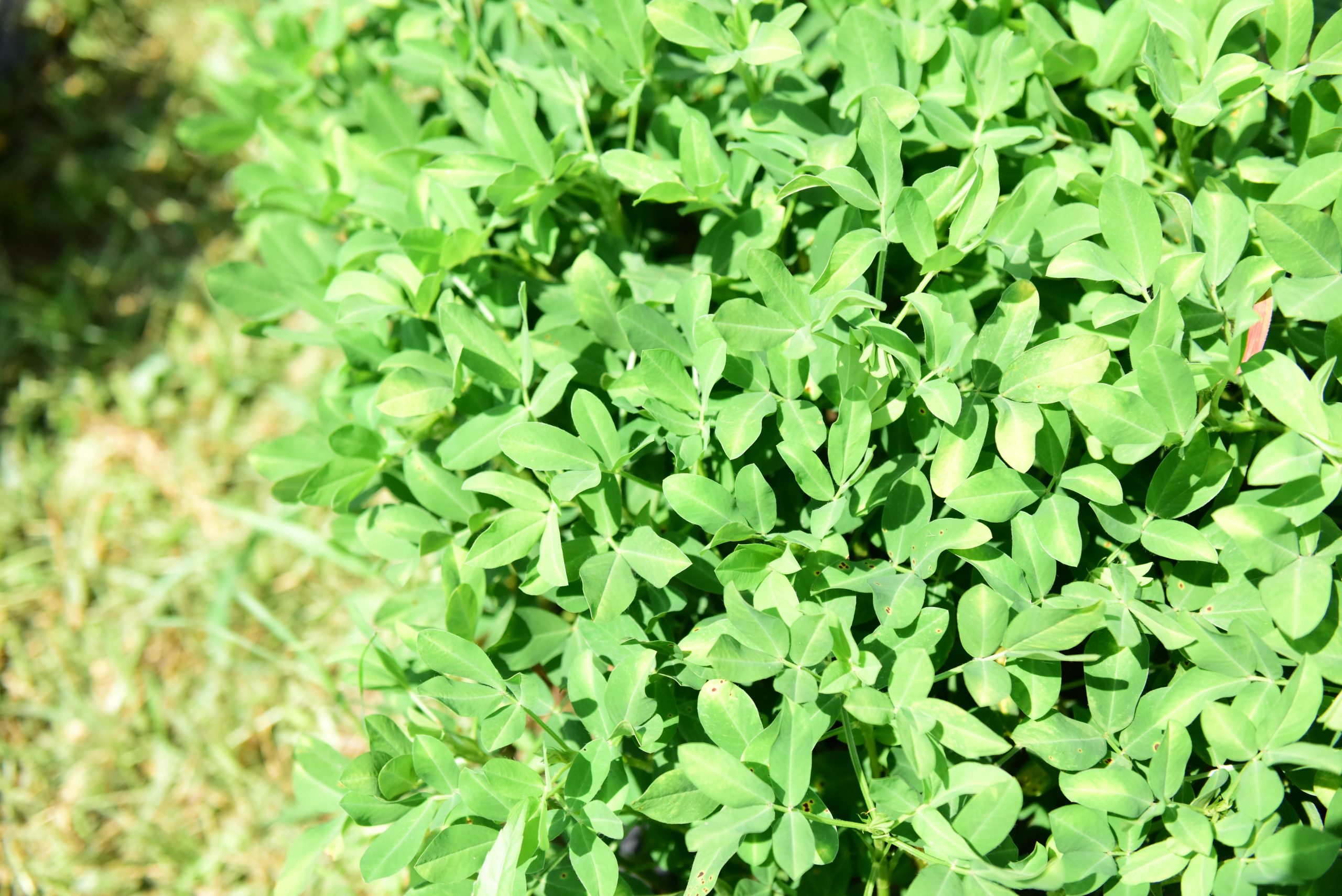
Harvesting peanuts is a fun experience for adults and kids alike. Dig to your hearts content for the bigger-than-usual peanuts that Aizu's rich soil produces. Of course, no harvest-party is complete without some freshly-boiled peanuts to snack on on-the-spot.
-
Experience Kentaro Matsuzaki's salesman-spirit and love for peanuts
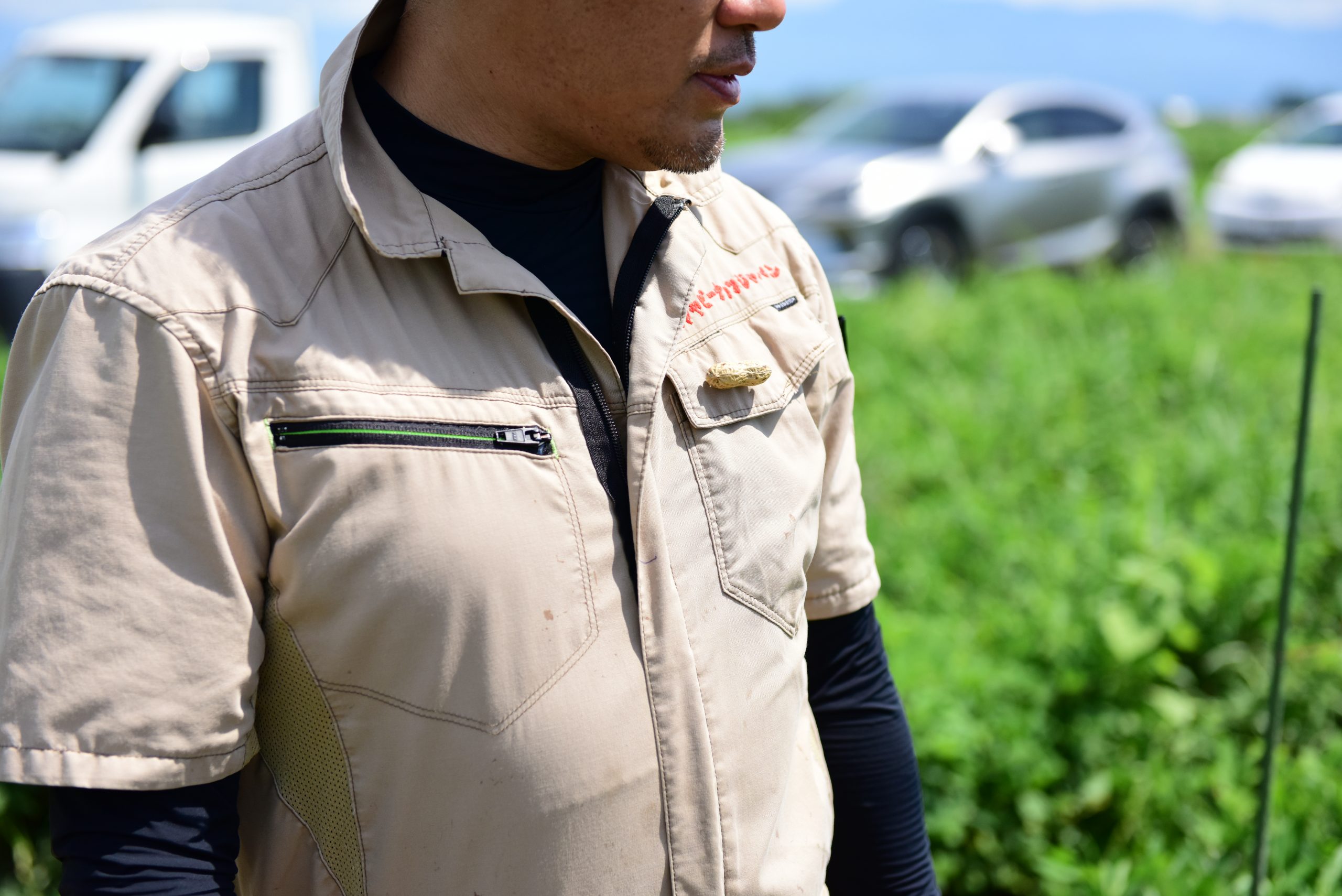
Kentaro Matsuzaki (APJ Co.Ltd.) has the kind of salesman-spirit that brings a community together. His story features many inspiring and emotional moments. Why not meet the man behind the peanuts?
-
A lunch course with all of Aizu's deliciousness, presented by chef Inoue
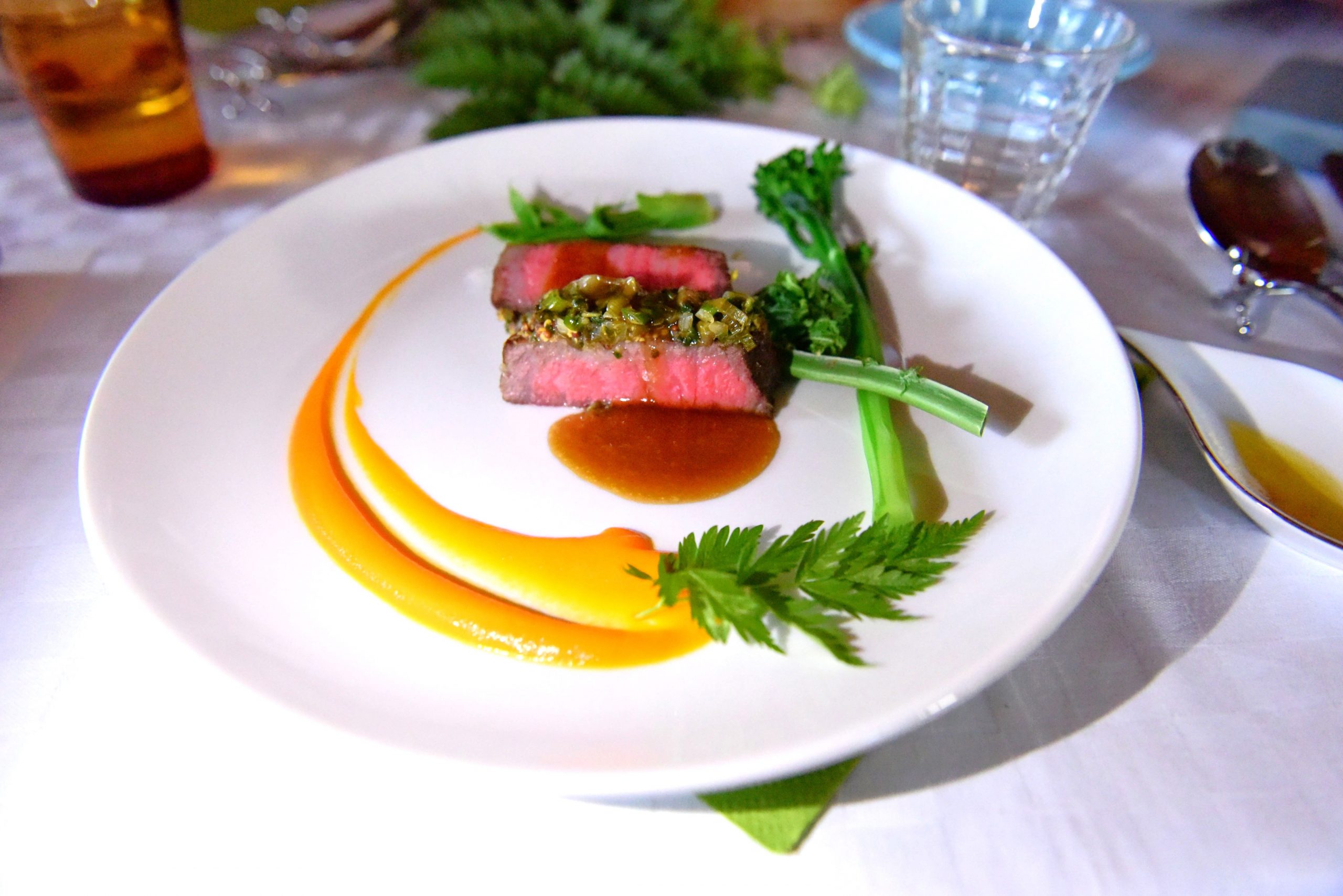
The lunch course for the day will be a product of the collaboration between Kentaro Matsuzaki, and chef Inoue, who loves Aizu more than anyone, featuring all the rich flavor this region has to offer.
Cast
- Global dreams for peanuts from Aizu Okuya Peanuts Japan Co.Ltd. - Kentarou MATSUZAKI
- Okuya Peanuts Japan works with 70 peanut farmers in the Aizu area to make Aizu's peanuts something to be proud of. Working together with around 15 centers for people with disabilities, Okuya cleans, selects, dries and roasts peanuts. What drives owner Matsuzaki?
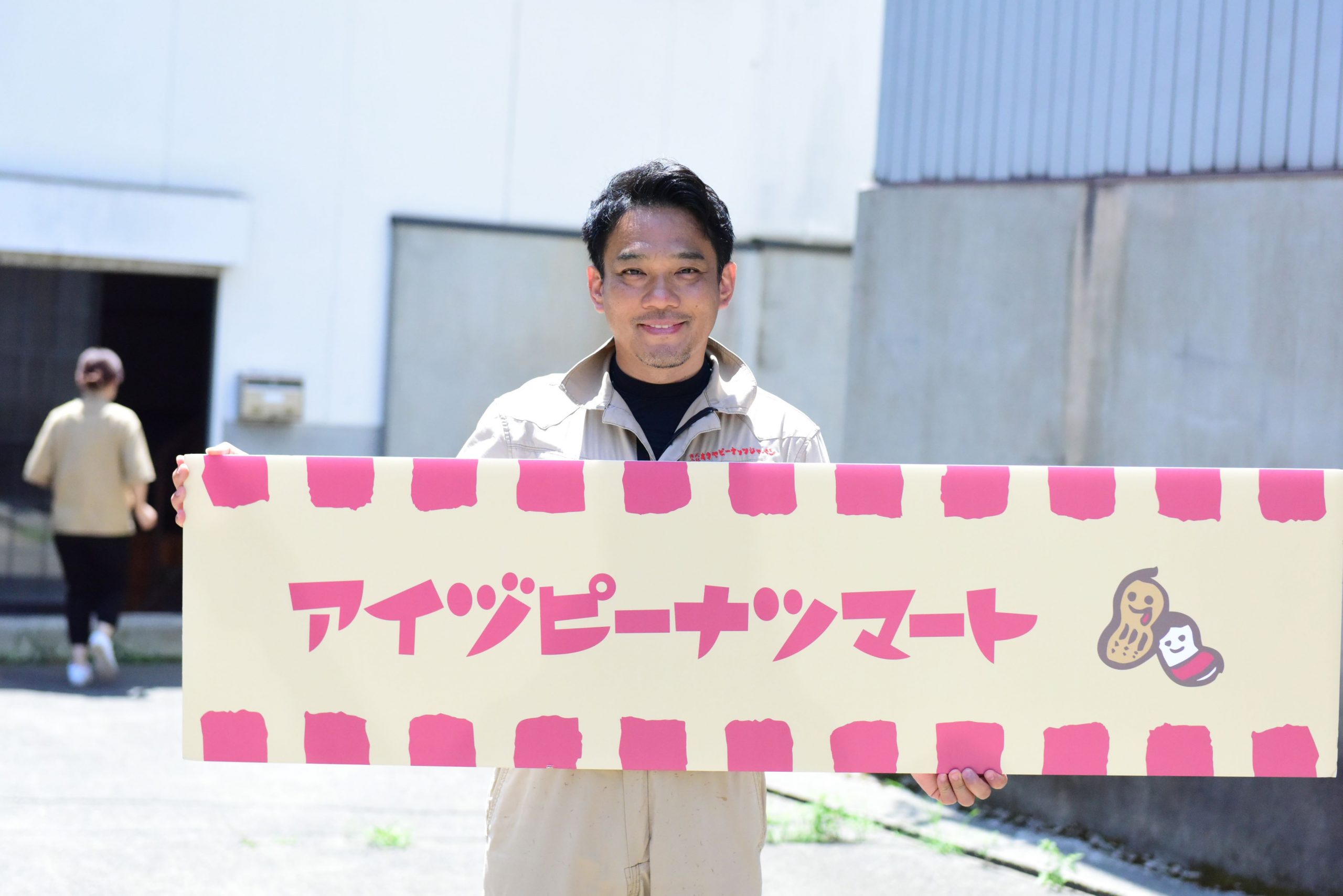
What I want to be when I grow up? Business owner.
At age 2o, Kentaro Matsuzaki first started his own company. When handing out his business cards to people he met, they would ask: “What kind of company is it? What do you do?” His reply would always be: “I don’t have any work in particular. Let me know if you have any work for me!” He did not have any particular line of work in mind, but one thing he was sure of: he wanted to do business. From helping with farm work such as weeding, to transportation services to and from hospitals, grocery shopping services, cleaning gravestones, and even attending funerals in someone else’s stead, Matsuzaki did anything. One thing he learned during this time: solving regional problems is a good way to do business.
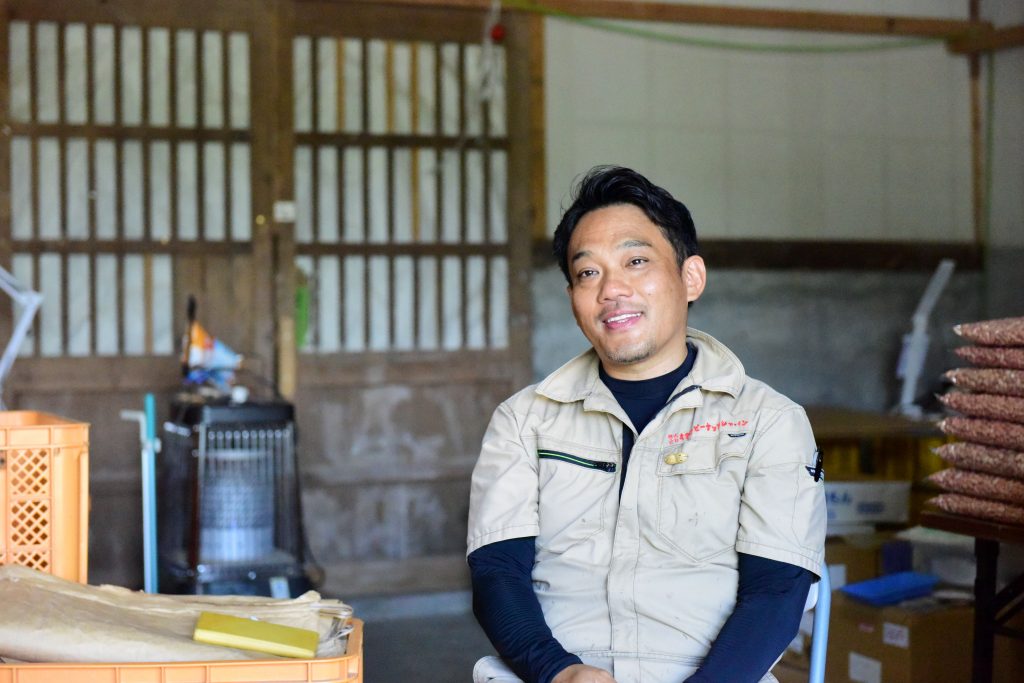
One of Matsuzaki’s elementary school albums lists his answer to the question “What do you want to be when you grow up?” as: “Business owner.”
The hidden history of peanut cultivation in Aizu
Later, Matsuzaki established a company that produced bean-based snacks, but when trying to make a switch to domestically-grown products, he found that good quality peanuts were hard to come by. This was about 13 years ago. “If they’re not available, we can give up on the idea, or grow peanuts ourselves,” Matsuzaki thought. Having always had a soft spot for farming, he chose the latter without hesitation. Farming had always been a difficult trade to start as a newcomer, with several challenges like finding good soil and acquiring the necessary equipment. Nowadays it is much easier to start an agricultural business, making the project feasible.
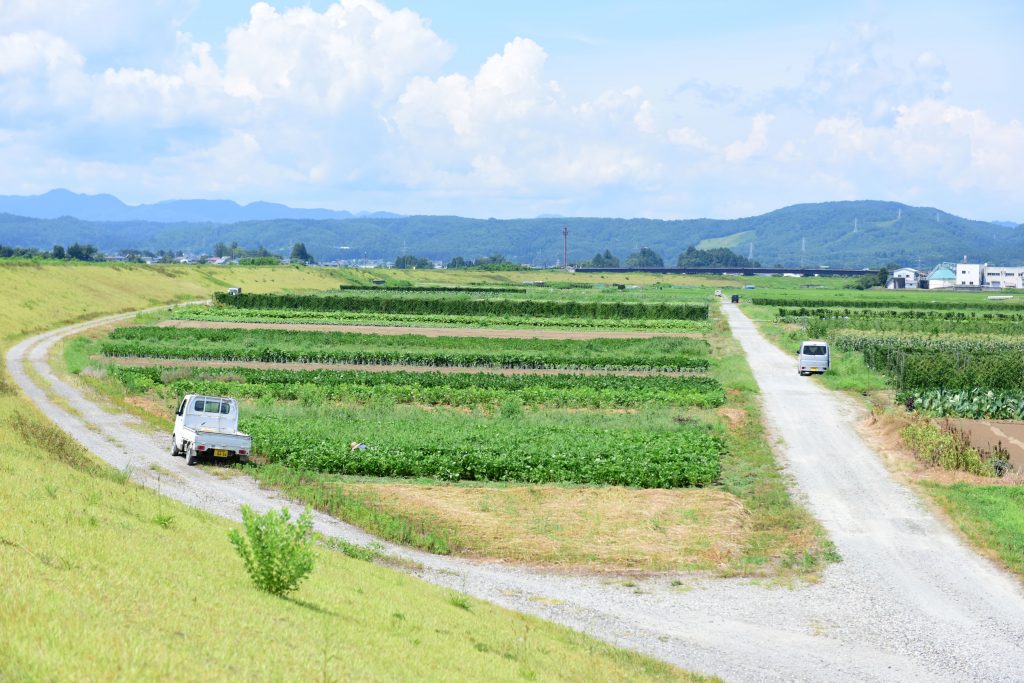
Peanut-fields near Aga River
Matsuzaki stumbled upon a surprising truth while starting up his peanut farm. For about 10 years since the mid-70s, peanuts had been grown in the Aizu area by contracted farmers. And not just a little: around 100 hectares of peanuts! Fascinated, Matsuzaki inspected documents he found about the cultivation, and met with farmers from that time, who told him all about the peanut farming situation back then. He learned that – because there was no place for the peanuts to be processed in the area – the peanuts would be shipped to factories in Chiba. This way, Aizu-peanuts would find their way to the market, labeled “From Chiba.” Later, it became possible to import cheap peanuts from abroad, which made their market value plummet, and meant the end of peanut farming in Aizu.
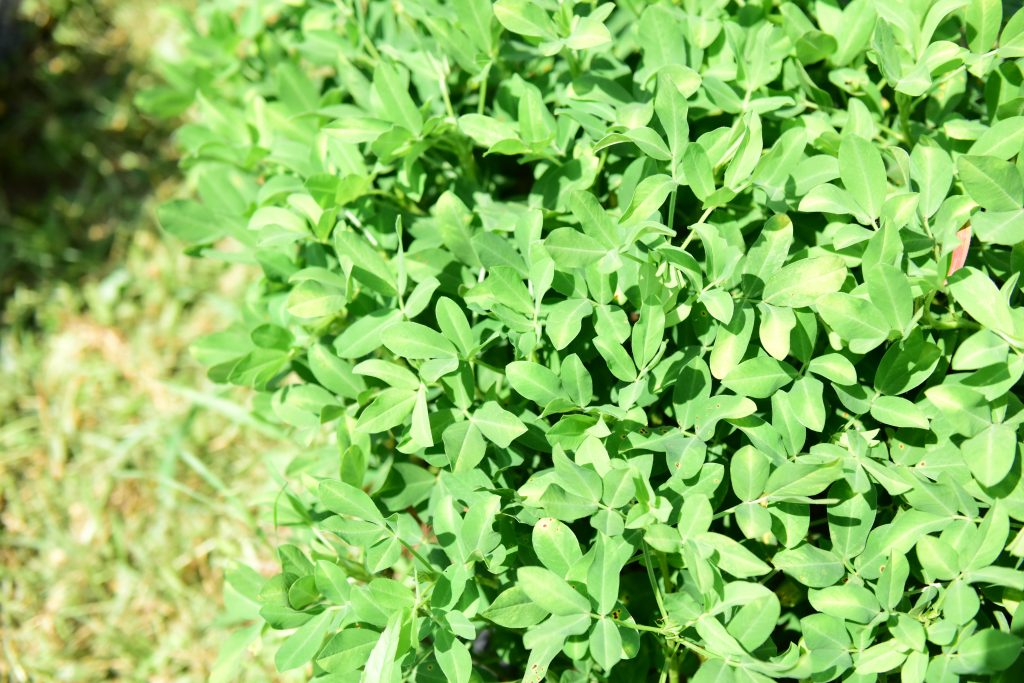
Come fall, this is where you can harvest large, delicious peanuts. This is what the leaves look like.
The fact that peanuts had been grown in his own region of Aizu 40 years ago was the most shocking revelation to Matsuzaki. Whether it was pure coincidence or Matsuzaki’s desire that led him to this encounter is open to interpretation. Regardless, it became his drive to help bring life to peanut farming in Aizu once more. In order to tackle his biggest challenges – peanuts as “From Aizu,” buying in peanuts from Aizu at a competitive price, and establishing his own processing factory – he established a new company: Okuya Peanuts Japan Co.Ltd. (now Aizu Peanuts Japan Co.Ltd.).
The story of a peanut salesman: peanuts that Aizu can be proud of worldwide
Nowadays, ‘agriculture and welfare cooperation’ is a common concept in Japan, but this was not yet the case when Matsuzaki started it. About 200 people from welfare facilities, such as people with intellectual disabilities, help peel 200 tons of peanuts by hand. Add 100 contracted farmers and 100 people working for processing companies (including Hayashida Shoten), and you’ve got around 400 local people working together. For Matsuzaki, rather than making a lot of profit for himself, his focus is on making sure the whole community benefits. He is still trying to include more players in the project. This story of a peanut salesman is what will bring peanuts to the limelight as something Aizu can be proud of worldwide. Pay a visit to the center of this new peanut-trade, with this edition of FoodCamp!
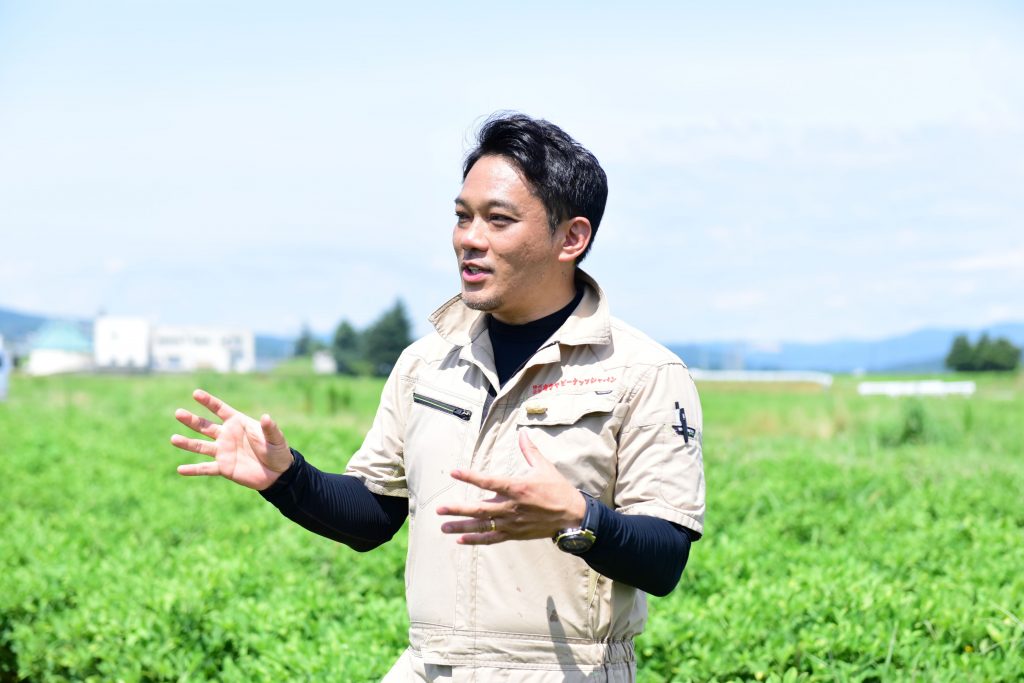
Matsuzaki, taking the story of a peanut-salesman to the world stage
- Discovering Aizu's seasonal ingredients as a calling Hashiyada Shoten - Koji INOUE
- Born in Kitakata City, Chef Inoue specializes in French cuisine, and worked as the saucier - a high ranking position - for a hotel restaurant. Making it his life's work to discover Aizu's seasonal products, we can't wait to see what he will bring to the table.
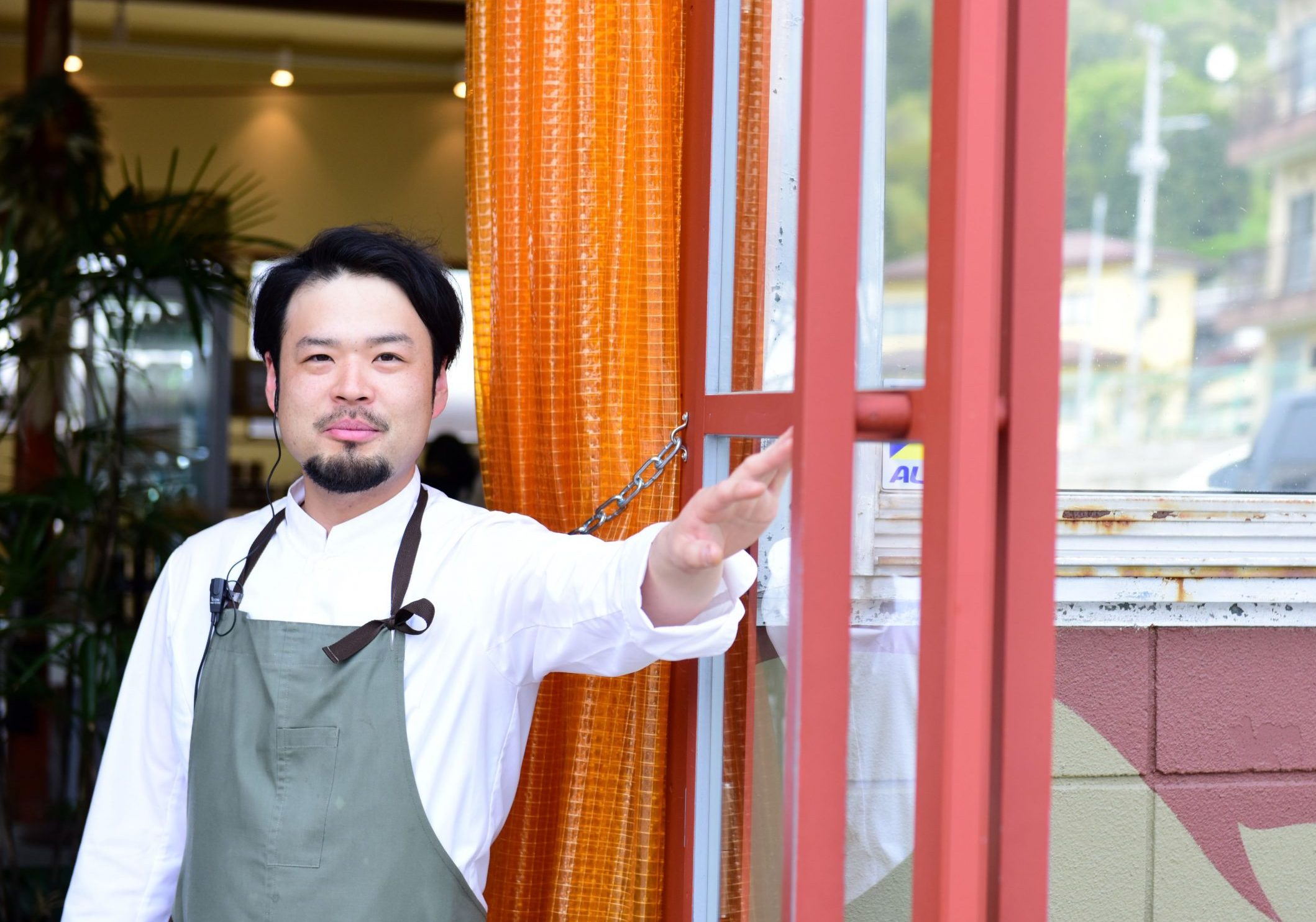
Cuisine as a way to make people happy
Chef Koji Inoue grew up cooking together with his mother and grandmother. They taught him many different home recipes, and everyone in his family enjoyed the dishes his own homecooked meals. This experience of making people happy by cooking for them is what led him on the path to becoming a chef.
After high school, Inoue entered a culinary school, where his first encounter with French cuisine made him fall in love for cooking more than ever before. Finding a job at the Koriyama View Hotel, he gained a very wide experience, from its French restaurant, to various international cuisines, catering to wedding parties, and cooking for receptions and banquets. He obtained the national ‘Western Cuisine Chef’-license, and got one of the most important jobs in a hotel kitchen: the saucier, a specialist in charge of soups and sauces. He gained further experience as the main chef for the chairman’s office of the Hoshi General Hospital in Koriyama City. Finally, he returned to his hometown of Kiyakata, where he joined Hashiyada Shoten, a local company specializing in the development and processing of new food products from local ingredients.
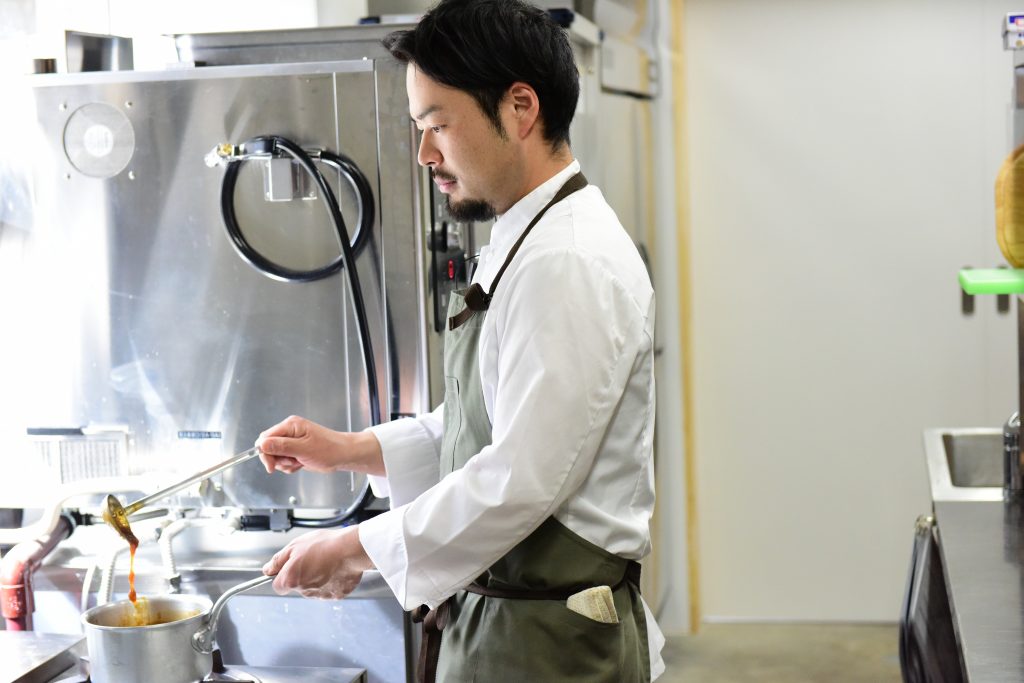
Chef Inoue gained invaluable experience as a saucier: a specialist in soups and sauces.
Aizu: a chef’s treasure trove
One thing Chef Inoue learned through the years is that Aizu is a veritable treasure trove of food. With Aizu Traditional Vegetables at the forefront, Aizu’s local culinary culture, with its abundance of unique ingredients, has been passed on through the generations. Aizu’s peanuts is one such ingredient. In other areas, peanuts are harvested multiple times throughout the year. But in Aizu, which turns into snow country every winter, harvesting is only possible once a year. The peanuts planted in spring take their sweet time growing and developing in the nutrition-rich soil and clean water of the Aizu basin, live through the particularly hot valley summer, and stock up on all the nutrition they need by the time they are harvested in autumn. This is what gives peanuts from Aizu their large size, as well as an almost chestnut-like texture, making it outstandingly flavorful, even when simply boiled with a bit of salt. They are exceptional, both in aroma and flavor.
Chef Inoue notes that one of the best features of Aizu is its long period harvesting period from fall to winter, in which many delicious foods can be enjoyed. “Being able to call a place with such abundant delicious food home is a real luxury,” says Inoue; a sentiment he feels strongly both as a chef and personally.
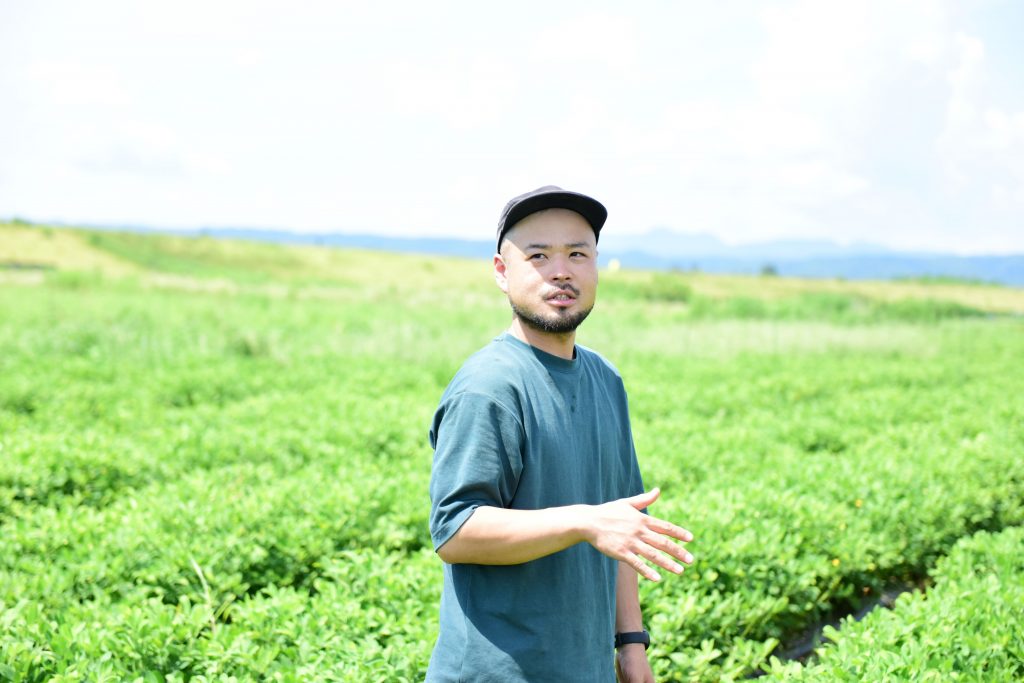
In his spare time, chef Inou often visits farms and mountains, to fulfil his life’s work: discovering all of Aizu’s seasonal foods.
A dream come true: contact with FoodCamp
Funnily enough, Chef Inoue already has FoodCamp-experience! He joined Chef Matsuoka of Restaurant L-Marl several times as an assistant in previous editions. “Chef Matsuoka always comes up with dishes and menus to surprise both producers and guests, and clearly has a good time himself too. I always hoped I’d get the opportunity to serve my food at FoodCamp too. Now that I’m getting that chance, I’m looking forward to it more than anyone!” says the chef. Joining forces with one of the best producers from his own hometown, Kentaro Matsuzaki, he is dedicated to presenting a meal all guests will enjoy.
We are 100% certain that this will be an edition of FoodCamp that will bring out the best of Kitakata’s bountiful autumn!
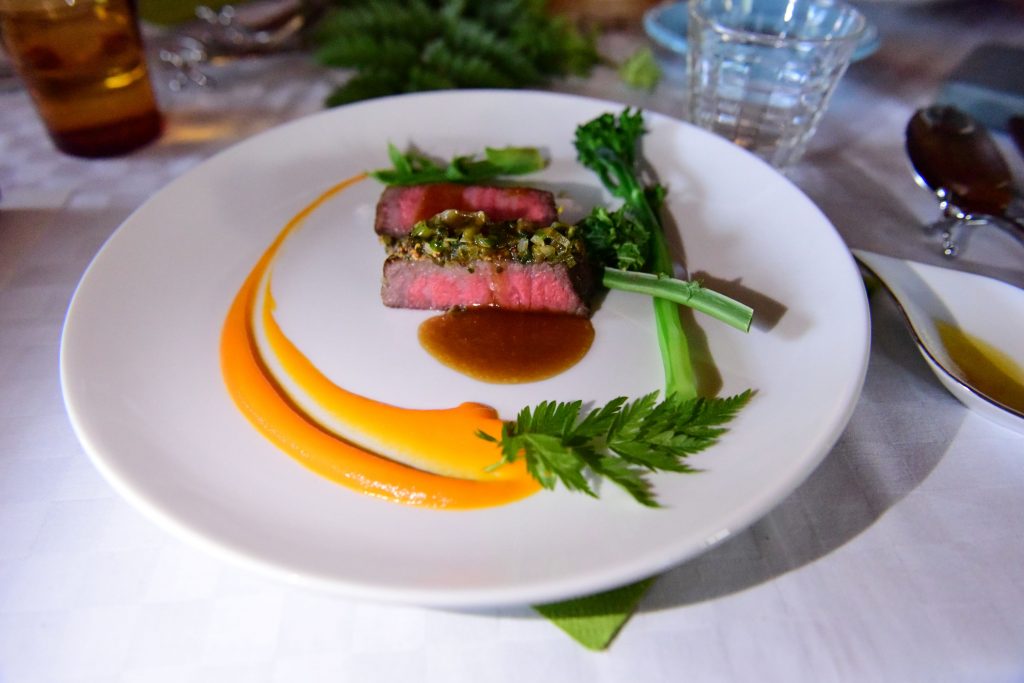
Wagyu roast beef with a delicious carrot sauce, jam-packed with veggy-goodness.
Tour Schedule
-
Pick-up / Meeting Place
8:40 a.m.
Pick-up by taxi (Koriyama Kanko Kotsu Taxi) from your house or place of stay in Koriyama, or at Koriyama Station. We will inform you of your pick-up time one day before the tour.
*For those scheduled for pick-up at Koriyama Station, please arrive at Koriyama Station by 8:30. -
Let's go!
9:10 a.m.
Departure for the tour site, from the Magonote Travel Asaka Office.
* Those coming to the Office directly, please arrive by 9:00 (limited parking available).
*We will make a brief stop at the Bandaisan Service Area. -
Arrival in Kitakata: Harvesting Experience
10:50 a.m.
We will arrive at a peanut farm in season. After APJ-owner Kentaro Matsuzaki tells us all about what makes his peanuts so great, it's time to harvest some delicious, ripe peanuts ourselves! Finally, enjoy some freshly-boiled peanuts on-the-spot.
* We will provide you with harvesting gloves. Please bring items like a hat and towel, and be sure to wear comfortable clothing. -
Arrival at the Peanut Center
12:35 p.m.
Next, we will head out to APJ's Peanut Center, where you will learn how the peanuts find their way to the market: from the selection, to the cleaning and roasting.
-
Lunchtime!
13:10 p.m.
Enjoy a wonderful lunch, featuring some of the best ingredients of Aizu's fall season, in an area of the Peanut Center magincally transformed into a dining area. The menu will be provided by Chef Inoue, in charge of product development at Hashiyada Shoten. Chef Inoue is specialized in soups and sauces, with a background in French cuisine. His life's work is going into the mountains of Aizu to discover delicious local ingredients. We can't wait to see what Chef Inoue comes up with!
-
Departure
15:25 p.m.
Time flies when you're having fun. We will depart from the Aizu Peanut Center and make a brief stop at the Kita-No-Sato Roadside Station for some souvenir shopping, before heading back to the Magonote Travel Asaka Office.
-
Arrival at the Magonote Travel Asaka Office
17:30 p.m.
After arriving at the Magonote Travel Asaka Office, you will be brought by taxi to your home or place of stay in Koriyama City, or to Koriyama Station.
*For those planning further travel by public transportation please prepare an itinerary from 18:30 forward.
Tour details
- Date(s)
- October 22 (Sun.)
- Fee
-
*same rate applies for children/participants travelling to the venue directly with their own vehicle.Per person ¥18,700 - What to wear/bring
- ・This tour takes place outdoors. In case of clear skies, please prepare a hat or cap to protect you from the sunlight.
・Please wear comfortable shoes and clothing.
・In order to prevent the further spread of COVID-19, please wear a mask. - Conditions of Participation
- Participation open to everyone over elementary school-age, and able to participate on their own (no need for accompaniment by a care helper, or with permission from a doctor). Same price for adults and children.
- Operating Company
- Koriyama Kanko Kotsu K.K.
- Tour Operator
- Magonote Travel's own staff will accompany the tour.
- Payment Method
- Please refer to "How To Apply" for more information.
- Travel Insurance
- Travel insurance is required for all tours, in case of accidents and emergencies. The insurance fee is included in the price. For this reason, we need to ask for your date of birth.
- Cancellation Fee
-
The following cancellation fees will be charged for tours with lodging and tickets: 20 to 8 days in advance: 20%, 7 to 2 days in advance: 30%, the day before the tour: 40%, on the scheduled date before the tour starts: 50%, no-show without notice: 100%.
For one-day tours, the following fees will be charged retroactively from the day before the start of the tour: 10 to 8 days in advance: 20%, 7 to 2 days in advance: 30%, 1 day in advance: 40%, on the scheduled date before the tour starts: 50%, no-show without notice: 100%. - In case of bad weather
- The tour will not be cancelled in case of bad weather. However, in case the tour has to be cancelled due to a natural disaster, you will be informed one day before the tour. In this case, you will receive a full refund.
- Minimum number of participants
- If there are fewer than 15 participants the tour will be cancelled. In such case we will inform you at least 4 days in advance.
- Terms and Conditions of Travel
- Please visit the ‘Terms and Conditions of Travel'-page.
- Other points of caution
- In order to prevent the spread of COVID-19, we ask all guests to fill in a health-check form beforehand. We will send you the details after we have received your application. Thank you in advance for your cooperation.






